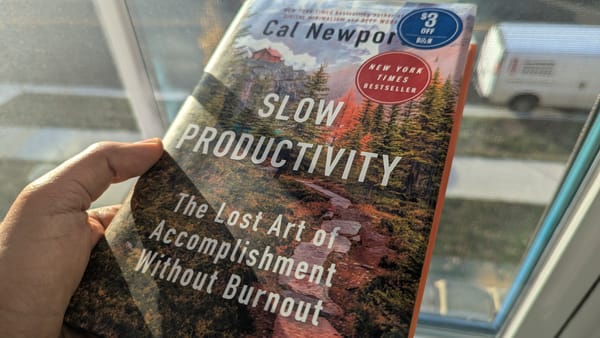All-In Podcast: insights from E230
AI Doomerism, Economic Realities, and the Battle for Future Tech
The All-In Podcast:
It truly found its voice during the lockdown days of COVID, and like a poker player going "all-in" on a hand they deeply believe in, the four hosts committed fully to the conversation. What began as an essential huddle has since blossomed into a significant platform, one they and their listeners increasingly see as a new kind of influential forum; aiming to host "the world's most important conversations," much like the WEF shaped global discourse in decades past.
For me, while I appreciate the breadth of their discussions (including the inevitable political insights that keep one informed), it’s when they lay their cards on the table regarding tech, VC, and the high-stakes game of AI that I’m most engaged. It’s more than just a podcast; it’s witnessing them go all-in, shaping the dialogue week after week.
What I learned from Episode 230:
Jason Calacanis: The Pragmatic Provocateur
Jason, often steering the conversation, zeroes in on the tangible impacts of AI, particularly job displacement. He pushes his co-hosts to address the immediate future for workers in industries like transportation, questioning how quickly automation like robo-taxis will reshape employment [00:02:32 - 00:02:39] ⏰. "We're seeing robo taxis start to hit the streets, and I don't think anybody believes that being a cab driver is going to exist as a job 10 years from now," he states, urging a realistic look at the velocity of change [00:25:52 - 00:26:03] ⏰. He also highlights the immediate effects on white-collar and entry-level positions, referencing a tweet from Chamath and citing real-world examples from founders about AI's superiority in tasks like writing job descriptions, noting, "100% AI is better at that job" [00:35:24 - 00:35:40] ⏰. Jason isn't just fearmongering; he’s pressing for an honest acknowledgment of the disruptions AI is already causing, even as new opportunities may eventually emerge.
David Sacks: The Ideological Watchdog
Sacks brings a critical lens to the motivations behind "AI doomerism," suggesting that much of the alarm is strategically amplified. He points to a pattern where sensationalist claims, like AI creating bioweapons or causing mass job loss, tend to grab headlines and may coincide with fundraising efforts by companies like Anthropic [00:03:25 - 00:03:41] ⏰. "There is a pattern of trying to grab headlines by making the most sensationalist version of what could be a legitimate concern," he argues. Sacks delves deeper, outlining what he calls an "AI existential risk industrial complex," funded by groups like Open Philanthropy (backed by Dustin Moskovitz) with ties to the Effective Altruism movement [00:12:06 - 00:12:36] ⏰. He suggests this network aims for global AI governance and has close ties to the Biden administration, influencing policy towards regulation that could stifle innovation and inadvertently benefit competitors like China [00:13:00 - 00:14:39]⏰. His core concern is that the real dystopian risk isn't rogue AI, but government overreach using AI as a tool for control.
Chamath Palihapitiya: The Strategic Skeptic & Market Analyst
Chamath echoes Sacks' skepticism about the altruistic motivations behind some AI safety warnings, dryly noting their "pretty coincidental" timing with Anthropic's fundraising moments [00:09:35 - 00:09:44] ⏰. "I think that there is a very smart business strategy here," he posits, suggesting it's an angle for companies like OpenAI and Anthropic to compete with giants like Meta and Google who have vast internal resources [00:09:58 - 00:10:19]. On the job front, Chamath highlights the impact on new graduates, explaining his tweet that "New grads were our autocomplete" [00:36:08 - 00:36:14] ⏰. He argues that AI tools enhance the productivity of existing employees, reducing the need for entry-level hires in established organizations and pushing new talent towards younger companies or entrepreneurship [00:36:27 - 00:37:04] ⏰. Later, pivoting to fiscal policy, Chamath emphasizes that the path out of national debt is through GDP growth, critically linked to robust energy policy, stating, "We are at a standstill sitting here today in 2025. On margin, we're actually short power".
David Friedberg: The Optimistic Technologist & Systems Thinker
Friedberg offers a counter-narrative to AI-driven job destruction, arguing that technology historically creates leverage, leading to more investment and ultimately more jobs [00:06:40 - 00:06:47] ⏰. "When you have a higher ROI on deployed capital, do you deploy more capital or less capital?" he asks, suggesting that increased productivity from AI will lead to more capital deployment and economic growth [00:06:59 - 00:07:25] ⏰. He believes the "velocity is greater, but the benefit will be faster," leading to deflationary effects, making goods and services cheaper and improving lifestyles [00:27:50 - 00:28:13] ⏰. Friedberg is also wary of framing AI development as a simple "race" between nations with a clear finish line [00:44:46 - 00:44:55]. "I don't think that there is a finish line in AI," he contends, viewing AI as a new paradigm that will bring continuous improvement and widespread economic prosperity, potentially even fostering global peace by reducing resource constraints [00:45:29 - 00:46:27] ⏰.
All in 230



